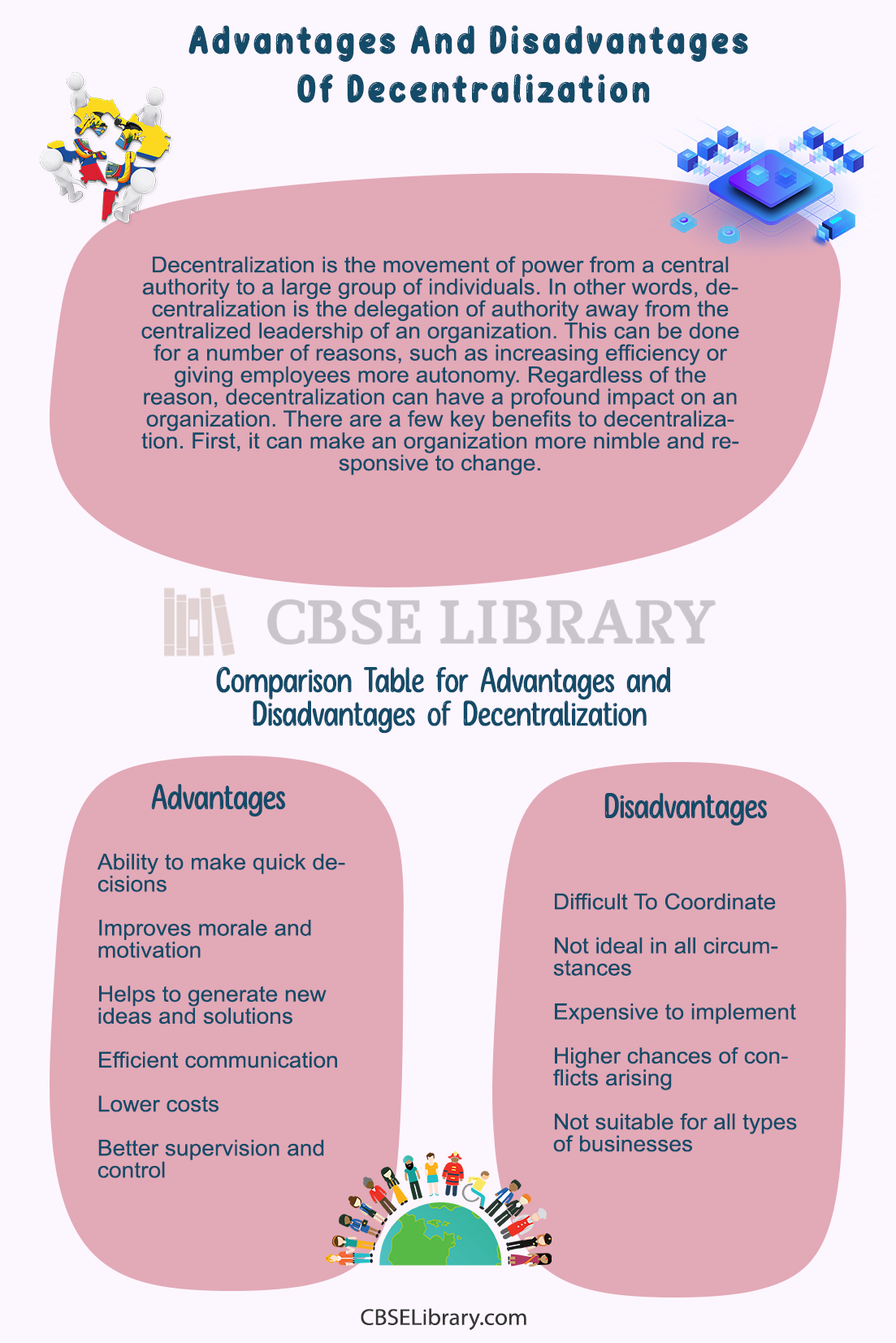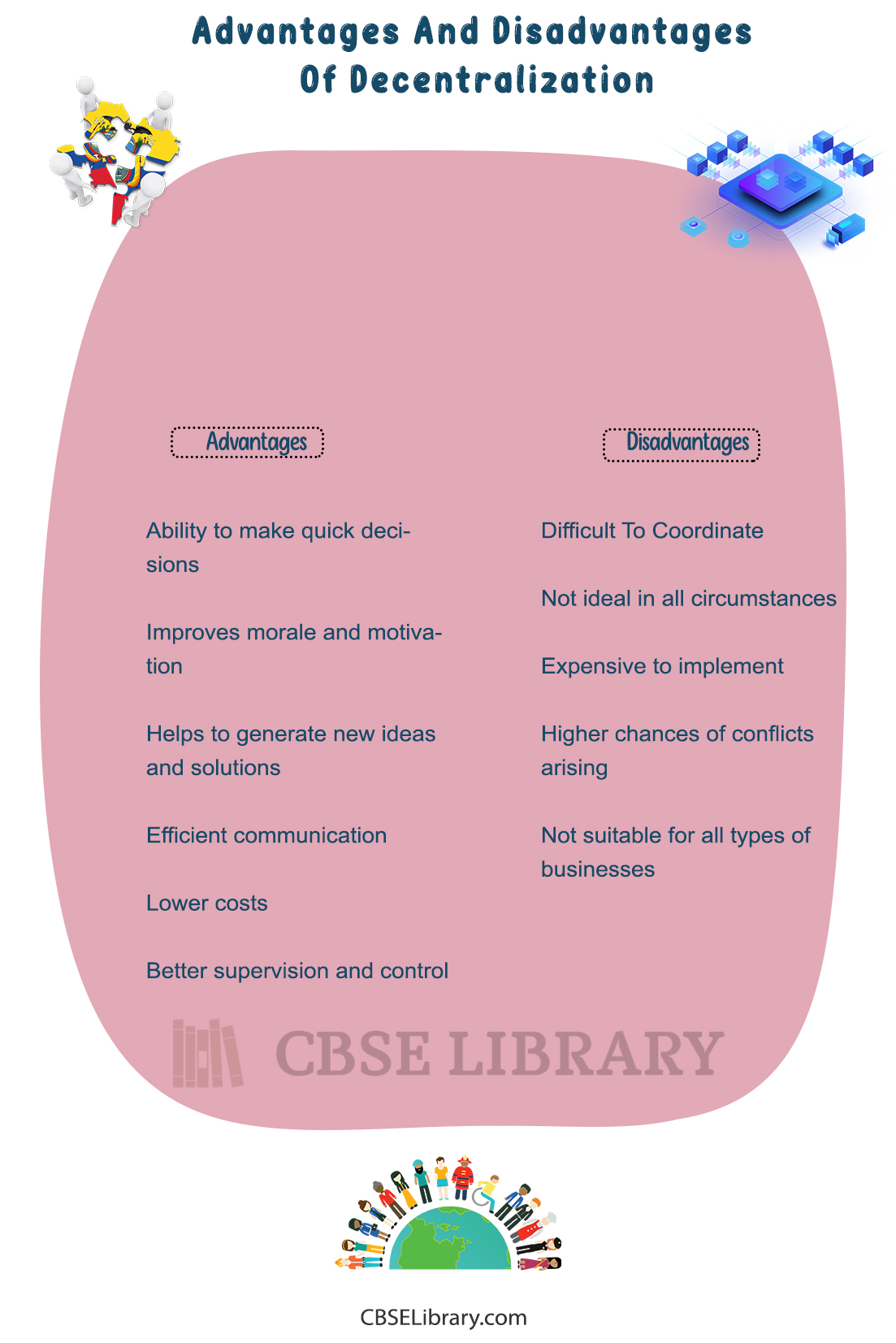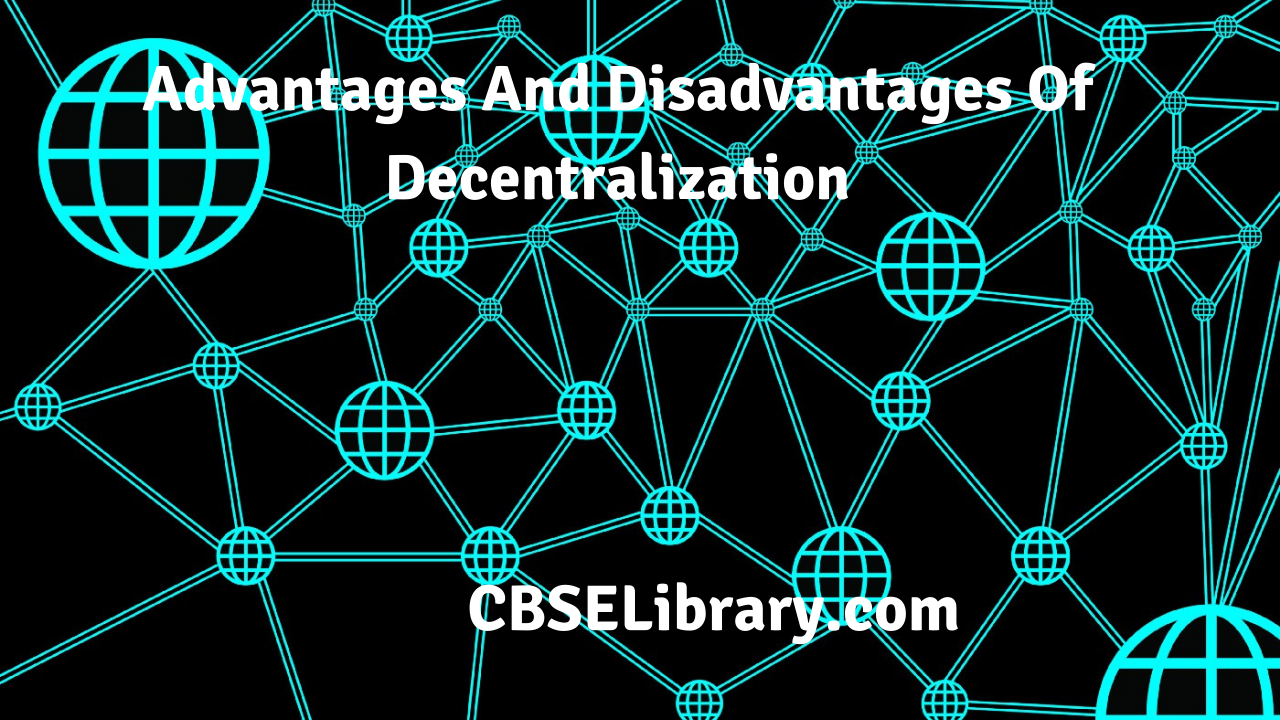Advantages And Disadvantages of Decentralization: Decentralization is the movement of power from a central authority to a large group of individuals. In other words, decentralization is the delegation of authority away from the centralized leadership of an organization. This can be done for a number of reasons, such as increasing efficiency or giving employees more autonomy. Regardless of the reason, decentralization can have a profound impact on an organization. There are a few key benefits to decentralization. First, it can make an organization more nimble and responsive to change.
Students can also find more Advantages and Disadvantages articles on events, persons, sports, technology, and many more.
When decisions are made closer to the point of implementation, they can be made more quickly and with greater knowledge of the situation. This can lead to better decision-making overall. Second, decentralization can improve morale and employee engagement. When employees have more control over their work, they tend to be more invested in its success. This leads to higher levels of productivity and creativity. Finally, decentralization can create a stronger sense of community within an organization. When employees feel like they are part of something larger than themselves, they are more likely to be loyal and committed to the organization’s success.
- Advantages of Decentralization
- Disadvantages of Decentralization
- Comparison Table for Advantages and Disadvantages of Decentralization
- Conclusion on Decentralization – Advantages And Disadvantages
- FAQs on Advantages And Disadvantages of Decentralization
Advantages of Decentralization
As discussed above, decentralization in business is the process of distributing power away from a centralized decision-making authority. This can be done in a number of ways, but typically involves giving employees more autonomy to make decisions and empowering them to take initiative. There are a number of advantages to decentralization in business, and these include:
- Ability to make quick decisions – It can lead to faster decision-making since decisions don’t have to be made by a single person or small group. This can be especially helpful in organizations that are growing quickly and need to be able to respond quickly to change.
- Improves morale and motivation – Another advantage is that it can help motivate and engage employees, who may feel more empowered and invested in their work if they have more control over what they do.
- Helps to generate new ideas and solutions – Additionally, decentralization can help create a more innovative environment since employees are encouraged to come up with new ideas and solutions.
- Efficient communication – Decentralized systems make it easier to communicate because everyone involved is in the loop. They are also more efficient because they eliminate redundancy and reduce the time spent on communication.
- Lower costs – Decentralized systems are less expensive than centralized systems because they don’t require a lot of specialists to carry out tasks. Centralized systems have a larger upfront cost, but they save money in the long run by reducing the need for specialists.
- Better supervision and control – Decentralization creates better supervision and control as there are more people in charge of a process or function. This system works because it’s easier to spot an error since there are more people responsible for monitoring or controlling the said function or process.
- Relieves stress for managers – Decentralization often takes the work off of managers and puts it onto workers. This removes some of the workload on managers, which can be a good thing if they’re feeling stressed. It also makes sure that there is no hierarchy and everyone shares in decision making. Since every worker has an equal voice, they’re more likely to feel invested in the company.
Disadvantages of Decentralization
There are also some challenges that come with decentralization. One is that it can lead to duplication of effort if different departments or groups are working on similar projects without coordination. Additionally, some people may resist change and prefer the old centralized way of doing things. Other disadvantages of decentralization are as follows:
- Difficult To Coordinate – Decentralization can be a great way to make things more democratic, but it’s often difficult for those people in charge of decisions to work with one another. If a company is decentralized, then it may be hard for the company to keep up with what different branches are doing and how they fit into the bigger picture. There can also be confusion because without centralized leadership, each section of the company has a lot more freedom and power to make decisions on their own.
- Not ideal in all circumstances – While decentralization is a great way to maximize innovation, it also has downsides. For example, organizations will have trouble forming coherent policies and implementing them across the organization. In addition, these companies can be fractured by different needs and interests.
- Expensive to implement – Proponents of decentralization in business argue that it is easier to scale and innovate. They also believe the goal of decentralization is to create a more democratic organization, where the focus is on the team and not just on one person. However, proponents do not mention the cost of decentralizing and how expensive it would be to implement. This has led many to believe that decentralization is only an option for large corporations who are able to afford its implementation.
- Higher chances of conflicts arising – Decentralization has many benefits and can be seen as the future for more organizations. However, if it’s not implemented properly, there can be many disadvantages. For example, a decentralized organization may experience conflict when trying to make decisions without a hierarchical chain of command.
- Not suitable for all types of businesses – Decentralized businesses are ideal for small businesses, where the decision-making procedures are much more flexible. However, the very same reason can make it difficult for a big company to have a decentralized structure. Decentralization is also not suitable for organizations that need a lot of cooperation between departments.

Comparison Table for Advantages and Disadvantages of Decentralization
Following are the advantages and disadvantages of Decentralization:
| Advantages | Disadvantages |
| Ability to make quick decisions | Difficult To Coordinate |
| Improves morale and motivation | Not ideal in all circumstances |
| Helps to generate new ideas and solutions | Expensive to implement |
| Efficient communication | Higher chances of conflicts arising |
| Lower costs | Not suitable for all types of businesses |
| Better supervision and control | |
| Relieves stress for managers |
Conclusion on Decentralization – Advantages And Disadvantages
Decentralization is a powerful tool that can help businesses improve efficiency and agility. When used properly, it can help businesses overcome challenges and realize new opportunities. While there is no one-size-fits-all approach to decentralization, businesses should carefully consider the benefits and challenges of decentralization before implementing it.

FAQs on Advantages And Disadvantages of Decentralization
Question 1.
What is Decentralization?
Answer:
Decentralization in business refers to the distribution of authority away from a single central location or person. This can be done for a number of reasons, including increasing efficiency, empowering employees, and reducing risk.
Question 2.
What are the types of decentralization?
Answer:
There are a few different types of decentralization, including functional, geographical, and organizational. Functional decentralization occurs when different parts of the organization are responsible for different functions. For example, a company may have a marketing team in one location and a sales team in another. Geographical decentralization happens when authority is distributed across different geographical areas. This could be done to tap into new markets or to better serve existing customers. Organizational decentralization is when authority is delegated to different levels within the organization, such as to managers or front-line employees.
Question 3.
What are the advantages and disadvantages of Decentralization?
Answer:
Decentralization can bring many benefits to businesses, including increased efficiency, empowered employees, and reduced risk. However, it’s important to carefully consider whether decentralization is the right choice for your business before making any decisions as it has a few downfalls – for instance, it can be difficult to maintain consistent standards across a decentralized organization.
Question 4.
Why is Decentralization important?
Answer:
Decentralization in business can mean a lot of different things, but ultimately it comes down to giving employees more autonomy and authority within the company. This can lead to improved communication and collaboration, as well as increased creativity and innovation. In addition, decentralization can help to improve morale and motivation among employees, as they feel more invested in their work. Ultimately, decentralization can help to improve the overall efficiency and effectiveness of a company.
